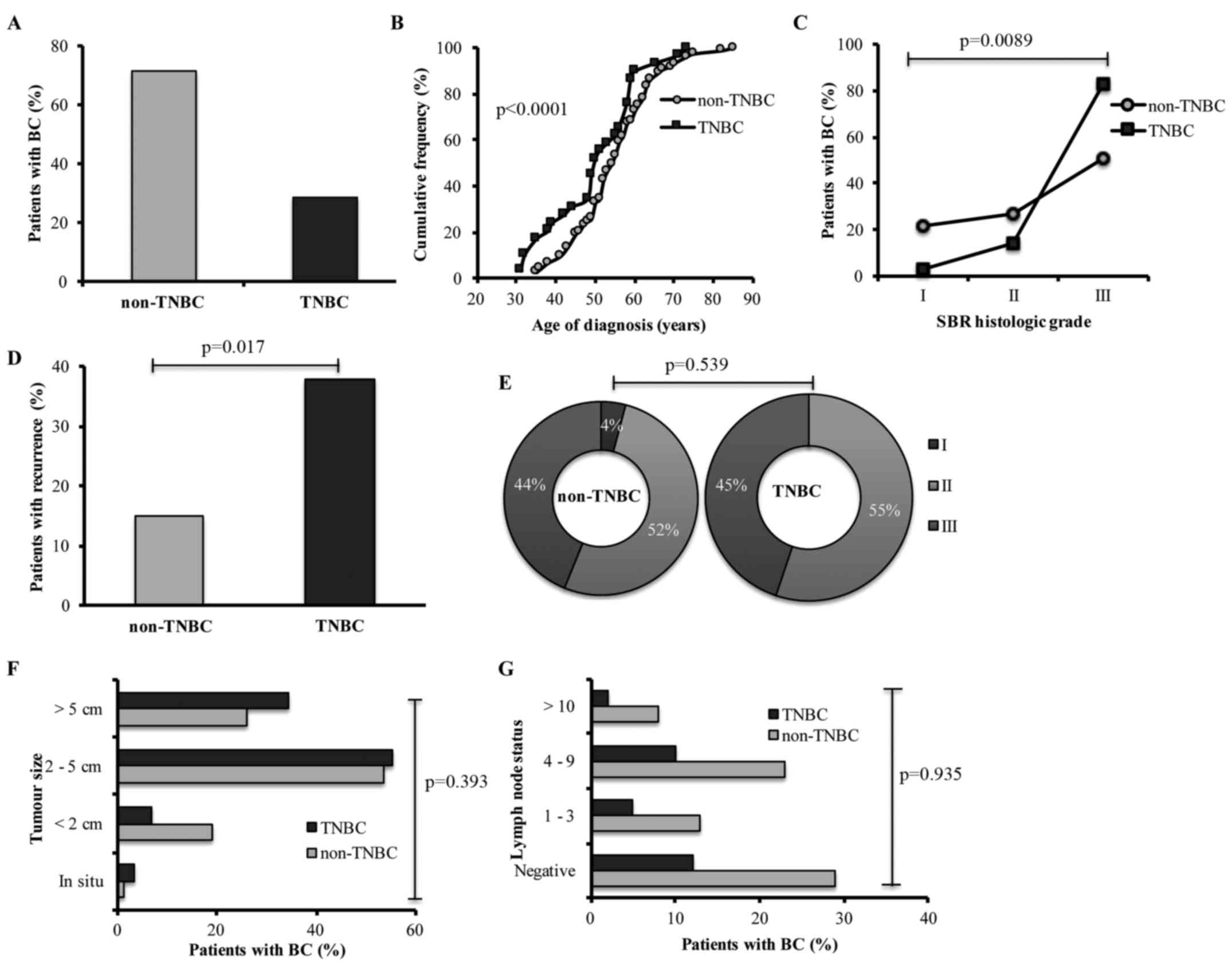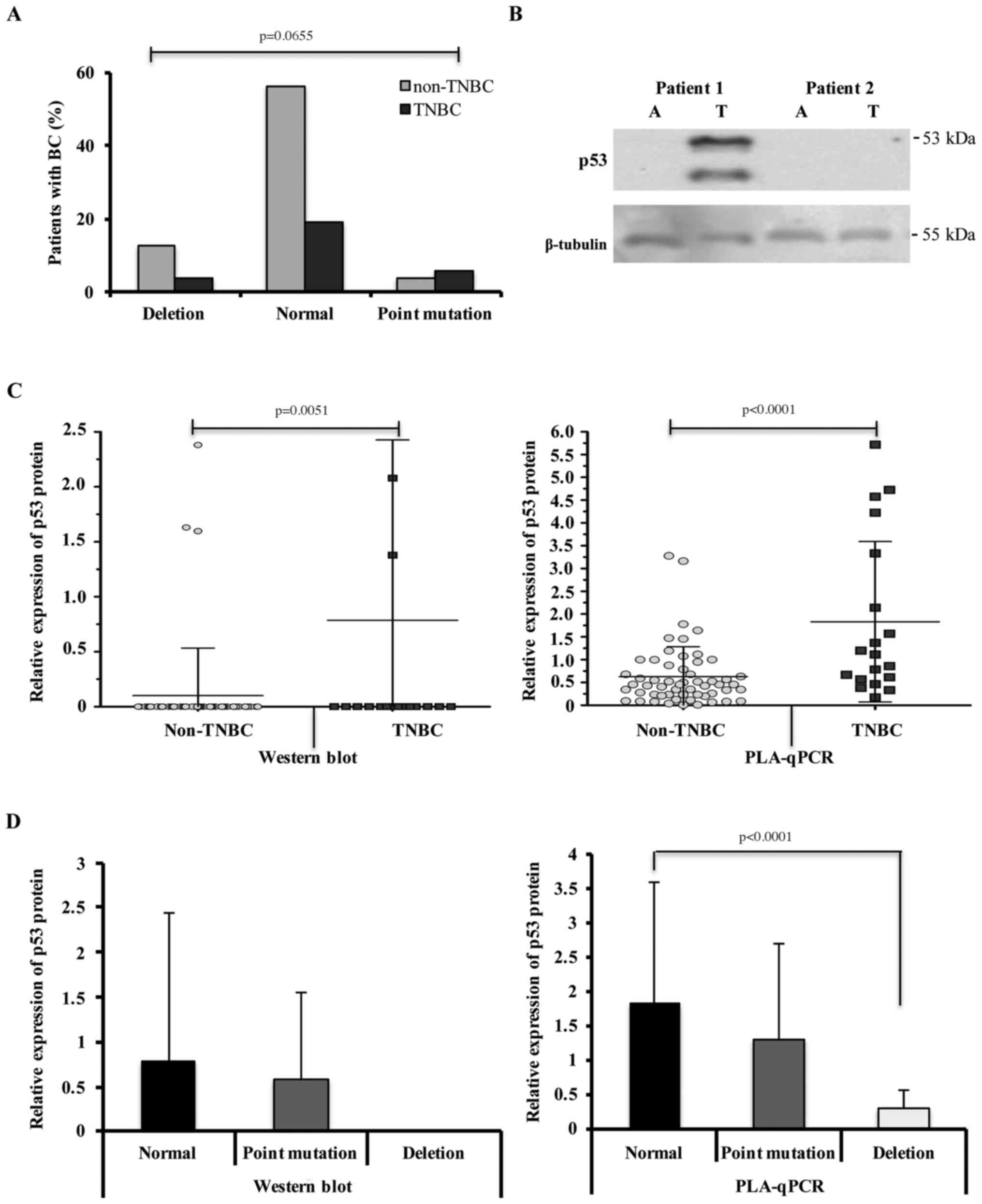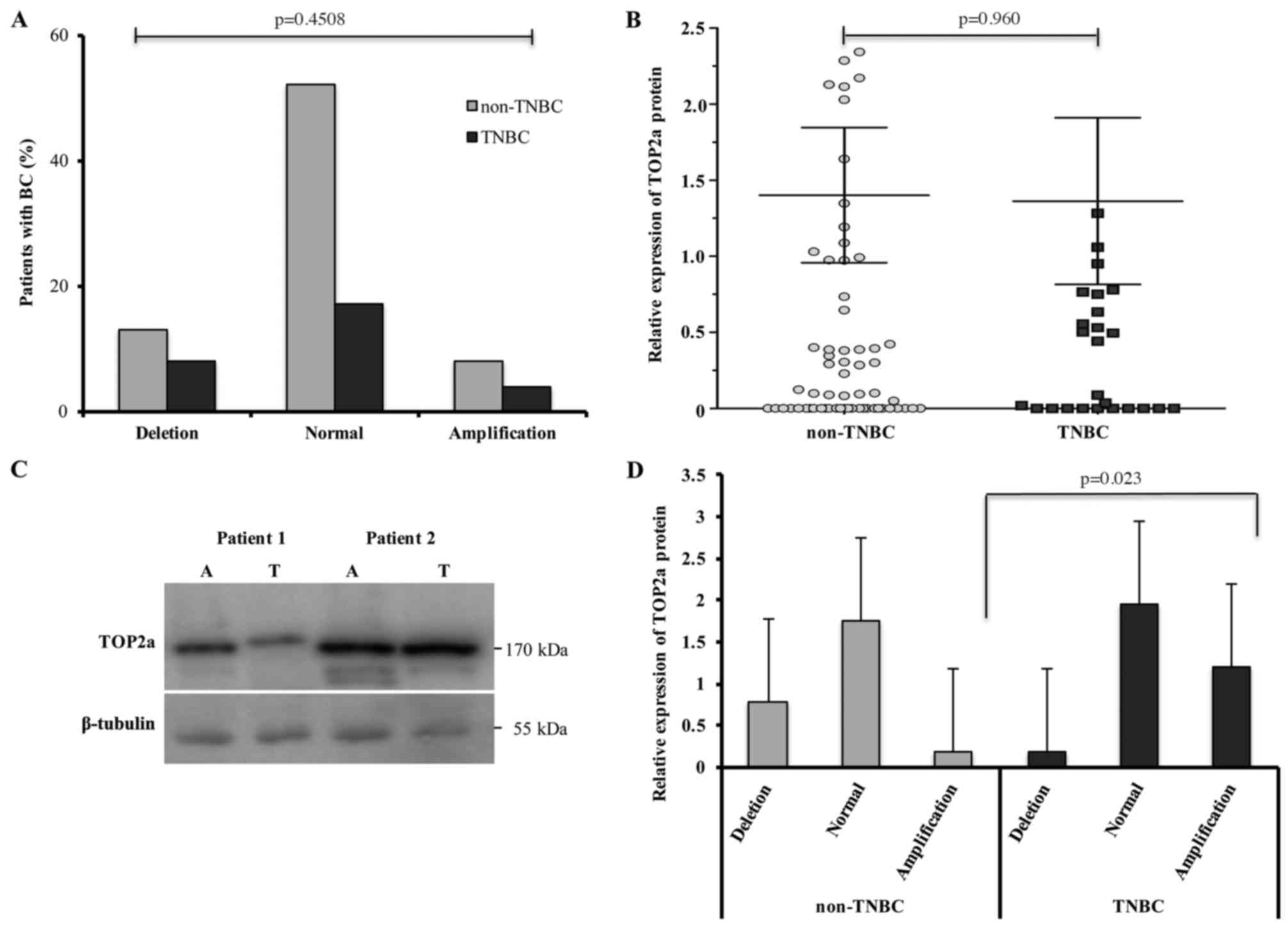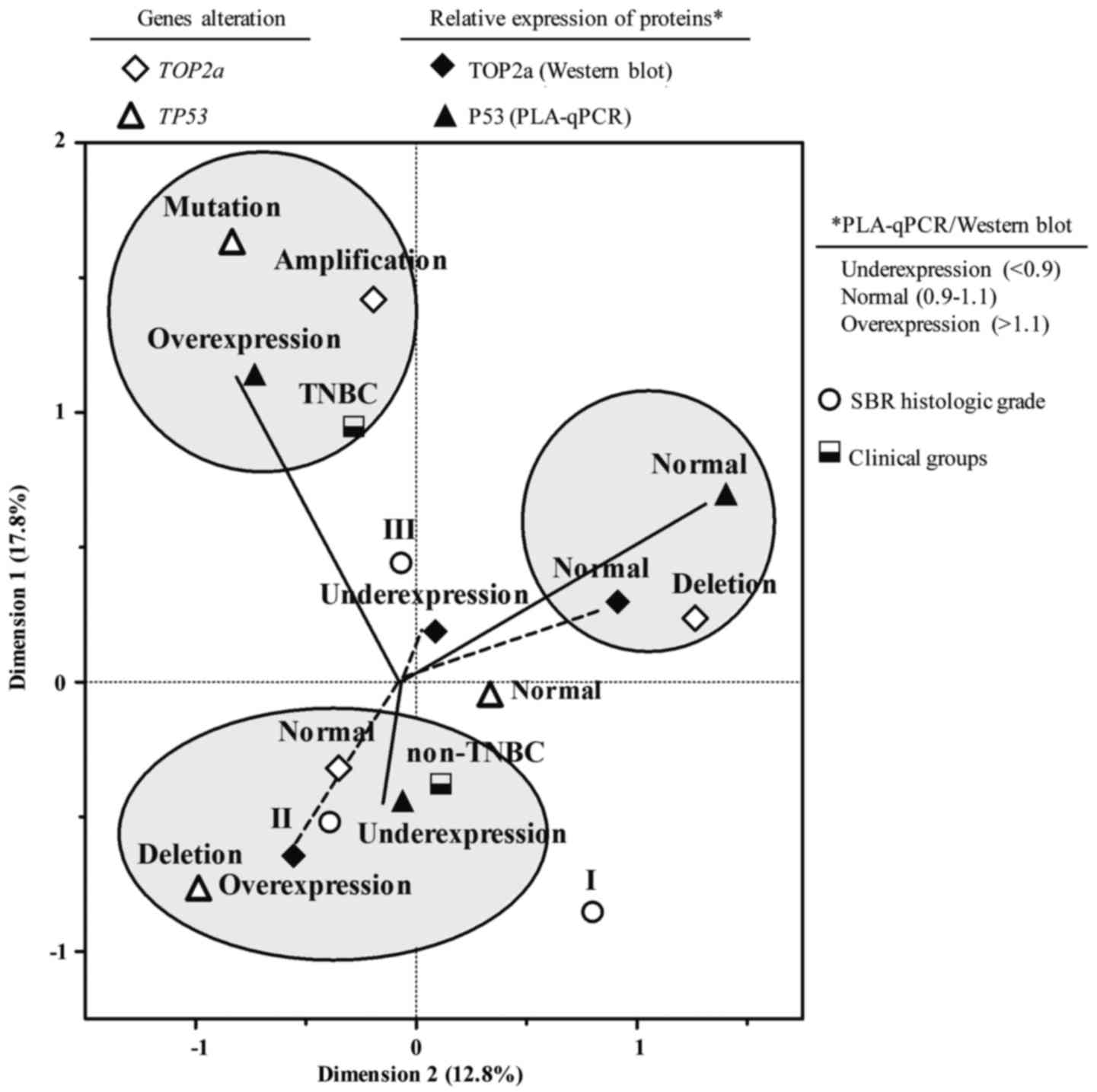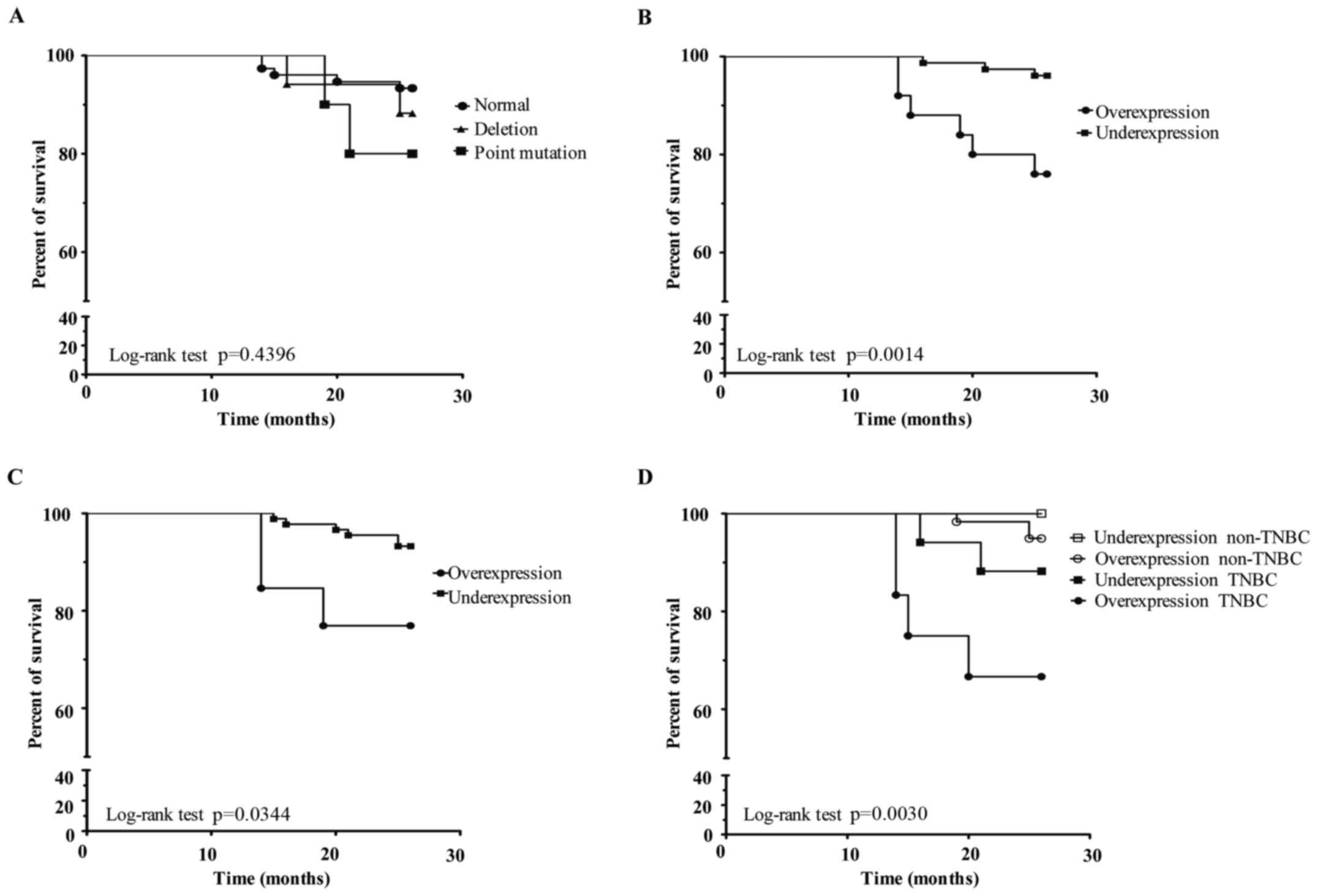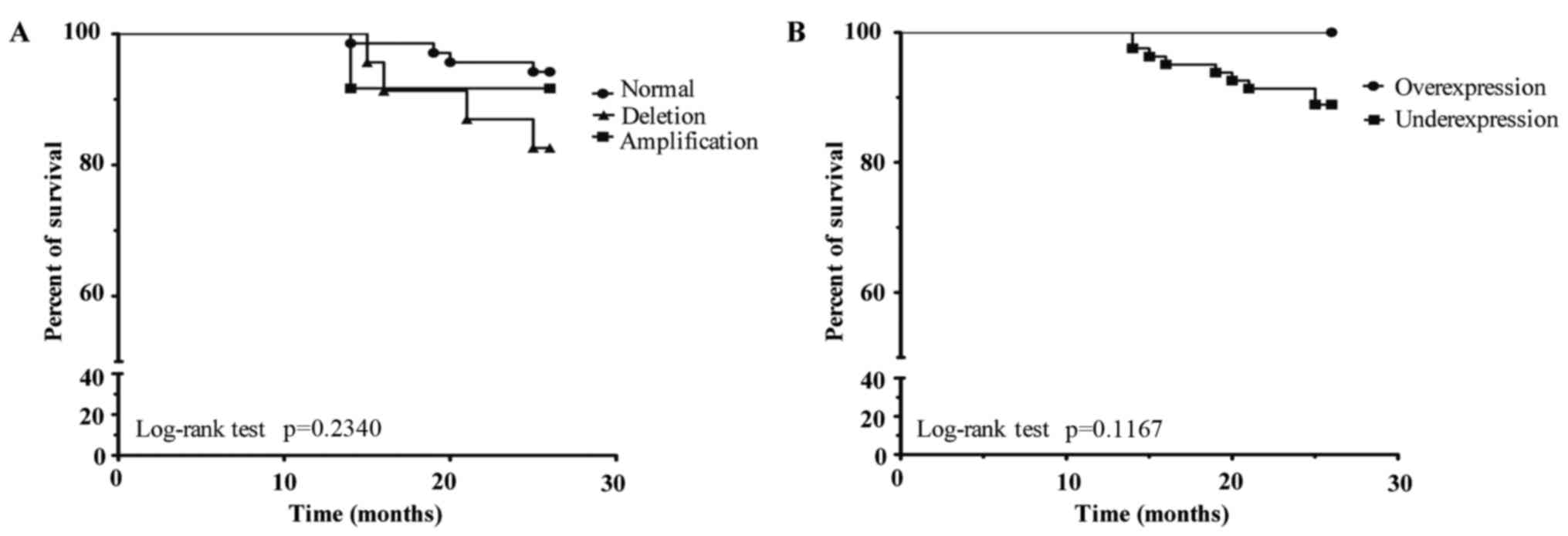|
1
|
Olivier M, Langerød A, Carrieri P, Bergh
J, Klaar S, Eyfjord J, Theillet C, Rodriguez C, Lidereau R, Bièche
I, et al: The clinical value of somatic TP53 gene mutations in
1,794 patients with breast cancer. Clin Cancer Res. 12:1157–1167.
2006. View Article : Google Scholar : PubMed/NCBI
|
|
2
|
Olivier M, Hollstein M and Hainaut P: TP53
mutations in human cancers: Origins, consequences, and clinical
use. Cold Spring Harb Perspect Biol. 2:a0010082010. View Article : Google Scholar : PubMed/NCBI
|
|
3
|
Banerji S, Cibulskis K, Rangel-Escareno C,
Brown KK, Carter SL, Frederick AM, Lawrence MS, Sivachenko AY,
Sougnez C, Zou L, et al: Sequence analysis of mutations and
translocations across breast cancer subtypes. Nature. 486:405–409.
2012. View Article : Google Scholar : PubMed/NCBI
|
|
4
|
Fountzilas G, Giannoulatou E, Alexopoulou
Z, Zagouri F, Timotheadou E, Papadopoulou K, Lakis S, Bobos M,
Poulios C, Sotiropoulou M, et al: TP53 mutations and protein
immunopositivity may predict for poor outcome but also for
trastuzumab benefit in patients with early breast cancer treated in
the adjuvant setting. Oncotarget. 7:32731–32753. 2016.PubMed/NCBI
|
|
5
|
Bieging KT, Mello SS and Attardi LD:
Unravelling mechanisms of p53-mediated tumour suppression. Nat Rev
Cancer. 14:359–370. 2014. View
Article : Google Scholar : PubMed/NCBI
|
|
6
|
Cho Y, Gorina S, Jeffrey PD and Pavletich
NP: Crystal structure of a p53 tumor suppressor-DNA complex:
Understanding tumorigenic mutations. Science. 265:346–355. 1994.
View Article : Google Scholar : PubMed/NCBI
|
|
7
|
Fernández-Cuesta L, Oakman C,
Falagan-Lotsch P, Smoth KS, Quinaux E, Buyse M, Dolci MS, Azambuja
ED, Hainaut P, Dell'órto P, et al: Prognostic and predictive value
of TP53 mutations in node-positive breast cancer patients
treated with anthracycline- or anthracycline/taxane-based adjuvant
therapy: Results from the BIG 02–98 phase III trial. Breast Cancer.
14:R702012. View
Article : Google Scholar
|
|
8
|
Wang Q, Zambetti GP and Suttle DP:
Inhibition of DNA topoisomerase IIα gene expression by the p53
tumor suppressor. Mol Cell Biol. 17:389–397. 1997. View Article : Google Scholar : PubMed/NCBI
|
|
9
|
Joshi AA, Wu Z, Reed RF and Suttle DP:
Nuclear factor-Y binding to the topoisomerase IIalpha promoter is
inhibited by both the p53 tumor suppressor and anticancer drugs.
Mol Pharmacol. 63:359–367. 2003. View Article : Google Scholar : PubMed/NCBI
|
|
10
|
Bartlett JM, Munro AF, Dunn JA, McConkey
C, Jordan S, Twelves CJ, Cameron DA, Thomas J, Campbell FM, Rea DW,
et al: Predictive markers of anthracycline benefit: A prospectively
planned analysis of the UK National Epirubicin Adjuvant Trial
(NEAT/BR9601). Lancet Oncol. 11:266–274. 2010. View Article : Google Scholar : PubMed/NCBI
|
|
11
|
Brase JC, Schmidt M, Fischbach T, Sültmann
H, Bojar H, Koelbl H, Hellwig B, Rahnenführer J, Hengstler JG and
Gehrmann MC: ERBB2 and TOP2A in breast cancer: A comprehensive
analysis of gene amplification, RNA levels, and protein expression
and their influence on prognosis and prediction. Clin Cancer Res.
16:2391–2401. 2010. View Article : Google Scholar : PubMed/NCBI
|
|
12
|
Di Leo A, Desmedt C, Bartlett JM, Piette
F, Ejlertsen B, Pritchard KI, Larsimont D, Poole C, Isola J, Earl
H, et al: HER2/TOP2Α Meta-analysis Study Group: HER2 and
TOP2A as predictive markers for anthracycline-containing
chemotherapy regimens as adjuvant treatment of breast cancer: A
meta-analysis of individual patient data. Lancet Oncol.
12:1134–1142. 2011. View Article : Google Scholar : PubMed/NCBI
|
|
13
|
Won HS, Lee KE, Sung SH, Choi MY, Jo JY,
Nam EM, Mun YC, Seong CM and Lee SN: Topoisomerase II alpha and
microtubule-associated protein-tau as a predictive marker in
axillary lymph node positive breast cancer. Tumori. 100:80–86.
2014.PubMed/NCBI
|
|
14
|
Györffy B, Lanczky A, Eklund AC, Denkert
C, Budczies J, Li Q and Szallasi Z: An online survival analysis
tool to rapidly assess the effect of 22,277 genes on breast cancer
prognosis using microarray data of 1,809 patients. Breast Cancer
Res Treat. 123:725–731. 2010. View Article : Google Scholar : PubMed/NCBI
|
|
15
|
Qiao JH, Jiao DC, Lu ZD, Yang S and Liu
ZZ: Clinical significance of topoisomerase 2A expression and gene
change in operable invasive breast cancer. Tumour Biol.
36:6833–6838. 2015. View Article : Google Scholar : PubMed/NCBI
|
|
16
|
Hill MO: Correspondence analysis: A
neglected multivariate method. Appl Stat. 3:340–354. 1974.
View Article : Google Scholar
|
|
17
|
Kim JY, Park K, Jung HH, Lee E, Cho EY,
Lee KH, Bae SY, Lee SK, Kim SW, Lee JE, et al: Association between
mutation and expression of TP53 as a potential
prognostic marker of triple-negative breast cancer. Cancer Res
Treat. 48:1338–1350. 2016. View Article : Google Scholar : PubMed/NCBI
|
|
18
|
Lara-Medina F, Pérez-Sánchez V,
Saavedra-Pérez D, Blake-Cerda M, Arce C, Motola-Kuba D,
Villarreal-Garza C, González-Angulo AM, Bargalló E, Aguilar JL, et
al: Triple-negative breast cancer in Hispanic patients: High
prevalence, poor prognosis, and association with menopausal status,
body mass index, and parity. Cancer. 117:3658–3669. 2011.
View Article : Google Scholar : PubMed/NCBI
|
|
19
|
Liedtke C, Mazouni C, Hess KR, André F,
Tordai A, Mejia JA, Symmans WF, Gonzalez-Angulo AM, Hennessy B,
Green M, et al: Response to neoadjuvant therapy and long-term
survival in patients with triple-negative breast cancer. J Clin
Oncol. 26:1275–1281. 2008. View Article : Google Scholar : PubMed/NCBI
|
|
20
|
Banegas MP, Tao L, Altekruse S, Anderson
WF, John EM, Clarke CA and Gomez SL: Heterogeneity of breast cancer
subtypes and survival among Hispanic women with invasive breast
cancer in California. Breast Cancer Res Treat. 144:625–634. 2014.
View Article : Google Scholar : PubMed/NCBI
|
|
21
|
Fountzilas G, Christodoulou C, Bobos M,
Kotoula V, Eleftheraki AG, Xanthakis I, Batistatou A,
Pentheroudakis G, Xiros N, Papaspirou I, et al: Topoisomerase II
alpha gene amplification is a favorable prognostic factor in
patients with HER2-positive metastatic breast cancer treated with
trastuzumab. J Transl Med. 10:2122012. View Article : Google Scholar : PubMed/NCBI
|
|
22
|
Hua W, Sa KD, Zhang X, Jia LT, Zhao J,
Yang AG, Zhang R, Fan J and Bian K: MicroRNA-139 suppresses
proliferation in luminal type breast cancer cells by targeting
Topoisomerase II alpha. Biochem Biophys Res Commun. 463:1077–1083.
2015. View Article : Google Scholar : PubMed/NCBI
|
|
23
|
Dobes P, Podhorec J, Coufal O, Jureckova
A, Petrakova K, Vojtesek B and Hrstka R: Influence of mutation type
on prognostic and predictive values of TP53 status in
primary breast cancer patients. Oncol Rep. 32:1695–1702.
2014.PubMed/NCBI
|
|
24
|
Bazrafshani MR, Nowshadi PA, Shirian S,
Daneshbod Y, Nabipour F, Mokhtari M, Hosseini F, Dehghan S,
Saeedzadeh A and Mosayebi Z: Deletion/duplication mutation
screening of TP53 gene in patients with transitional cell
carcinoma of urinary bladder using multiplex ligation-dependent
probe amplification. Cancer Med. 5:145–152. 2016. View Article : Google Scholar : PubMed/NCBI
|
|
25
|
Delfau-Larue MH, Klapper W, Berger F,
Jardin F, Briere J, Salles G, Casasnovas O, Feugier P, Haioun C,
Ribrag V, et al: European Mantle Cell Lymphoma Network: High-dose
cytarabine does not overcome the adverse prognostic value of
CDKN2A and TP53 deletions in mantle cell lymphoma.
Blood. 126:604–611. 2015. View Article : Google Scholar : PubMed/NCBI
|
|
26
|
Dufour A, Palermo G, Zellmeier E, Mellert
G, Duchateau-Nguyen G, Schneider S, Benthaus T, Kakadia PM,
Spiekermann K, Hiddemann W, et al: Inactivation of TP53 correlates
with disease progression and low miR-34a expression in previously
treated chronic lymphocytic leukemia patients. Blood.
121:3650–3657. 2013. View Article : Google Scholar : PubMed/NCBI
|
|
27
|
Millis SZ, Gatalica Z, Winkler J, Vranic
S, Kimbrough J, Reddy S and O'Shaughnessy JA: Predictive biomarker
profiling of > 6000 breast cancer patients shows heterogeneity
in TNBC, with treatment implications. Clin Breast Cancer.
15:473–481.e3. 2015. View Article : Google Scholar : PubMed/NCBI
|
|
28
|
Yang P, Du CW, Kwan M, Liang SX and Zhang
GJ: The impact of p53 in predicting clinical outcome of breast
cancer patients with visceral metastasis. Sci Rep. 3:22462013.
View Article : Google Scholar : PubMed/NCBI
|
|
29
|
Ren J, Chen QC, Jin F, Wu HZ, He M, Zhao
L, Yu ZJ, Yao WF, Mi XY, Wang EH, et al: Overexpression of Rsf-1
correlates with pathological type, p53 status and survival in
primary breast cancer. Int J Clin Exp Pathol. 7:5595–5608.
2014.PubMed/NCBI
|
|
30
|
Maeda T, Nakanishi Y, Hirotani Y,
Fuchinoue F, Enomoto K, Sakurai K, Amano S and Nemoto N:
Immunohistochemical co-expression status of cytokeratin 5/6,
androgen receptor, and p53 as prognostic factors of adjuvant
chemotherapy for triple negative breast cancer. Med Mol Morphol.
49:11–21. 2016. View Article : Google Scholar : PubMed/NCBI
|
|
31
|
Lehmann BD, Ding Y, Viox DJ, Jiang M,
Zheng Y, Liao W, Chen X, Xiang W and Yi Y: Evaluation of public
cancer datasets and signatures identifies TP53 mutant signatures
with robust prognostic and predictive value. BMC Cancer.
15:1792015. View Article : Google Scholar : PubMed/NCBI
|
|
32
|
Srikantan S, Abdelmohsen K, Lee EK,
Tominaga K, Subaran SS, Kuwano Y, Kulshrestha R, Panchakshari R,
Kim HH, Yang X, et al: Translational control of TOP2A influences
doxorubicin efficacy. Mol Cell Biol. 31:3790–3801. 2011. View Article : Google Scholar : PubMed/NCBI
|
|
33
|
Tamaichi H, Sato M, Porter AC, Shimizu T,
Mizutani S and Takagi M: Ataxia telangiectasia mutated-dependent
regulation of topoisomerase II alpha expression and sensitivity to
topoisomerase II inhibitor. Cancer Sci. 104:178–184. 2013.
View Article : Google Scholar : PubMed/NCBI
|
|
34
|
Rodriguez-Lara V, Peña-Mirabal E,
Baez-Saldaña R, Esparza-Silva AL, García-Zepeda E, Cervantes Cerbon
MA, Diaz D and Fortoul TI: Estrogen receptor beta and CXCR4/CXCL12
expression: Differences by sex and hormonal status in lung
adenocarcinoma. Arch Med Res. 45:158–169. 2014. View Article : Google Scholar : PubMed/NCBI
|















